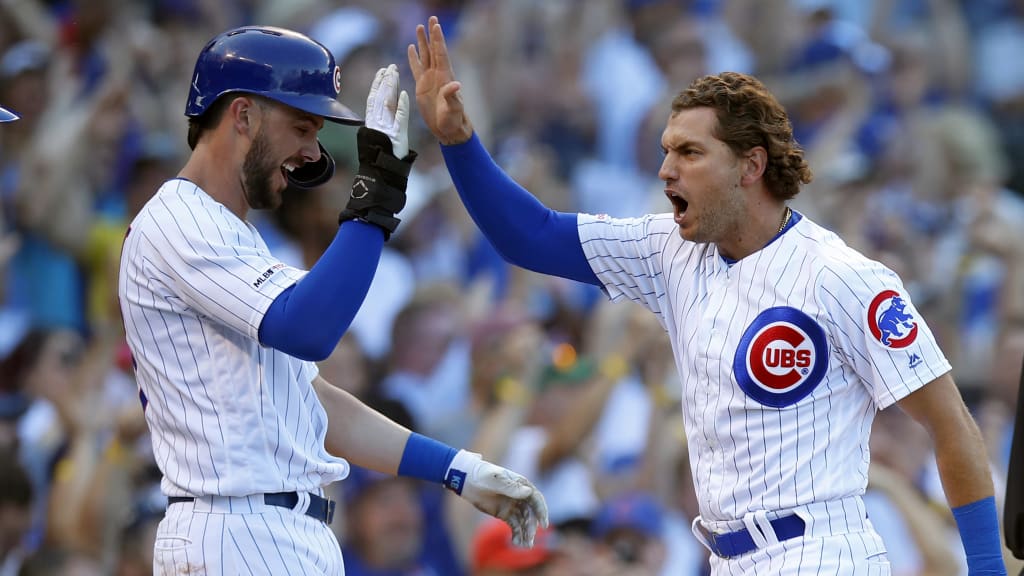
CHICAGO -- One of the driving factors behind the Cubs' inactive offseason has been the franchise's considerable arbitration class. The team is headed by star third baseman Kris Bryant, whose name has been attached to a bevy of rumors and speculation all winter.
Bryant was one of six Cubs to avoid the arbitration process on Friday with the Cubs, doing so with a one-year contract that was worth $18.6 million, according to sources. The club did not confirm the contract's value.
Given the makeup of the current roster, and the potential cost of the arbitration-eligible players, the Cubs are at risk of exceeding the luxury tax threshold for a second straight year. That is why trade rumblings have been and will continue to be more prevalent than free-agent talks for the North Siders as the 2020 campaign looms.
The deadline for exchanging proposed salary figures for one-year 2020 contracts was noon CT on Friday. The Cubs typically try to reach an agreement with their arbitration-eligible players by that deadline in an attempt to avoid the hearing process. With or without a deal by the exchange date, teams and players can continue to negotiate a contract in the days and weeks leading up to a scheduled hearing.
The eligible players
Albert Almora Jr., Javier Báez, Kris Bryant, Willson Contreras, Kyle Ryan and Kyle Schwarber
Deals struck
The one-year pact with Kris Bryant comes after he earned $12.9 million in an All-Star campaign last year. Also on Friday, the Cubs avoided arbitration with shortstop Javier Báez ($10 million), outfielder Kyle Schwarber ($7.01 million), catcher Willson Contreras ($4.5 million), outfielder Albert Almora Jr. ($1.575 million) and lefty Kyle Ryan ($975,000). The Cubs did not confirm the salary figures, which came via multiple sources.
The payroll situation
Prior to Friday's moves, the Cubs had roughly $135 million locked into the payroll, excluding a few split contracts handed out this offseason. Friday's signings bring the total cost for this arbitration class to $42.66 million. Add in pre-arb players, the rest of the 40-man roster, bonuses and other financial obligations, and Chicago is closing in on $200 million.
The Competitive Balance Tax payroll (luxury tax) uses average annual value rather than just the 2020 salary figure to calculate the figure used by MLB. This year, the first CBT threshold is $208 million, and the Cubs project to be right at the number or a little over with the current group of players. If the Cubs go over in '20, they will be subject to a 30-percent tax on the overage (the rate for being over two years in a row).
The Bryant situation
With Anthony Rendon (Angels) off the free-agent board, the baseball world is waiting to see where Josh Donaldson signs. Teams that missed out on signing either of those two might then shift attention to the trade market. That is why there has been a lot of noise about both Colorado's Nolan Arenado and Kris Bryant this offseason.
One sticking point for Bryant is his ongoing service-time grievance, which is expected to have an announced resolution in the coming weeks. If Bryant wins his case, he would become a free agent next winter. If Bryant loses the case, which many sources believe will be the expected outcome, he'll be under club control through 2021.
That situation would obviously impact that type of return the Cubs could get in a trade involving Bryant, so both Chicago and other teams are awaiting the outcome on that front. Once that is settled and Donaldson signs, more clarity about Bryant's future could arrive. That said, expect the Cubs to have a steep price on Bryant. While Chicago is trying to keep the long-term future in mind, the team still wants to contend in 2020.
Extension candidates
Friday's deals lock in salaries for 2020. They do not stop the Cubs from exploring extensions with any of the players. Javier Báez tops the list of potential extension candidates within the current arbitration group. The shortstop is in his second year of arbitration eligibility, just turned 27 years old and has developed into an all-round talent and MVP Award candidate.
Willson Contreras, who has emerged as one of the top catchers in the Majors, looks like an extension candidate, too. But, given that Contreras is in his first year of arbitration eligibility, there is less urgency to offer him a multiyear deal at this point in time.
While Kris Bryant has expressed an interest to stay with the Cubs long-term, the team knows it can be an uphill climb trying to reach a deal with agent Scott Boras.
Trade candidates
Kris Bryant and Willson Contreras have been mentioned the most in the offseason trade chatter. If the Cubs do not view an extension with Bryant as realistic, it makes sense for Chicago to see if it can find a deal that would inject some impact prospects or young MLB talent into its system. Contreras is under control through 2022, so that makes him an attractive piece for teams in need of catching.
Among the rest of the arbitration players, Kyle Schwarber is also a trade candidate. The left fielder had a robust second half in 2019 (.997 OPS) and a career year (38 homers, 92 RBIs and .871 OPS), but trading his contract would offer some flexibility. It would be one path to possibly trying to re-sign corner outfielder Nicholas Castellanos.
The Cubs' arbitration history
Under president of baseball operations Theo Epstein, who joined the Cubs' front office prior to the 2012 season, the North Siders have gone to an arbitration hearing only once. Epstein's team of negotiators has also established a strong reputation for reaching agreements by the deadline for exchanging salary figures.


